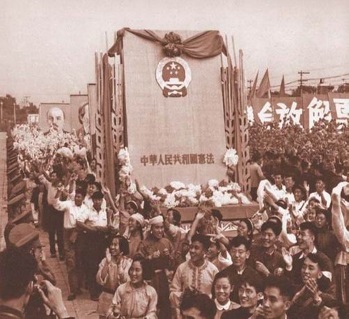|

China’s First National Critique:The 1954 Campaign to “Discuss the Draft Constitution”
Thursday, January 15, 2015
2:00 PM - 3:30 PM
Bunche Hall 10383
Neil Diamant, Dickinson College
In 1954, as part of the “National Discussion of the Draft Constitution,” Chinese engaged in a surprisingly wide-ranging deliberation about political and social rights, the obligations of citizenship, state symbols, political institutions and ideology. Many asked frank, penetrating and frequently prescient questions about law, class, and political power, and offered provocative suggestions for revision. We will delve into the content of this constitutional discussion and examine its implications for the historiography of the PRC and the way we understand Chinese constitutionalism.
Neil J. Diamant is Professor of Asian Law and Society at Dickinson College and Chair of the East Asian Studies Department. He is the author of Revolutionizing the Family:Politics, Love, and Divorce in Urban and Rural China, 1949-1968(2000), Engaging the Law in China:State, Society and Possibilities for Justice(2005)and Embattled Glory:Veterans, Military Families and the Politics of Patriotism in China, 1949-2007(2009). Before joining the Dickinson faculty in 2002, he taught at Tel Aviv University in Israel.
His articles on various aspects of Chinese law and society have appeared in The Journal of Conflict Resolution, Modern China, The Journal of East Asian Studies, Politics and Society, Armed Forces and Society, Frontiers of History in China, The Law and Society Review and The China Quarterly, among others. He received his Ph.D. in Political Science from UC Berkeley. He is currently working on popular constitutionalism in the Mao era and political activism among PLA veterans(including lawsuits, petitions, mass protests and online blogging). | |
|

Oasis Capitalism:Muslim Notables and the Qing Empire in Chinese Central Asia, 1759-1864
Thursday, January 15, 2015
4:00 PM - 5:30 PM
Bunche Hall 10383
Kwangmin Kim, University of Colorado
From 1759 to 1864, the Qing Empire ruled oases of Chinese Central Asia(Xinjiang), laying the foundation for the continued Chinese dominance of the region which lasted until the present. This talk sheds light on the pivotal role played by the Muslim notables(begs), in Qing imperial expansion. Rather than passively accommodating the powerful military advances of the Qing, I argue in this talk that the begs proactively sought the patronage of the Qing. They did so in order to advance their own agenda of promoting capitalist transformation of the oases, taking advantage of the expansion of global trade into the region since the sixteenth century. This talk shows how the begs, a new commercialized elite of diverse origins(descendants of nomadic nobles, and caravan merchants, and most importantly sufi leaders)built thriving commercial, agricultural, mining, and ranching enterprises under Qing protection. It also shows how their capitalist initiative created ever-intensifying conflict between the oasis urban centers and rural hinterlands, which proved to be fatal to the security of the Qing empire in the long run.
Kwangmin Kim specializes in early modern China and East Asia. He received his Ph.D. from the University of California at Berkeley, and currently teaches Chinese and global history at the University of Colorado at Boulder. His research focuses on the history of empire, borderlands, and transnational relations. His recent publications include "Profit and Protection:Emin Khwaja and the Qing Conquest of Central Asia, 1759–1777," The Journal of Asian Studies 71, no. 03(2012). He is currently preparing for the publication of his first book titled Borderland Capitalism:Muslim Notables and the Qing Empire in Chinese Central Asia, 1759-1864.
| |

















